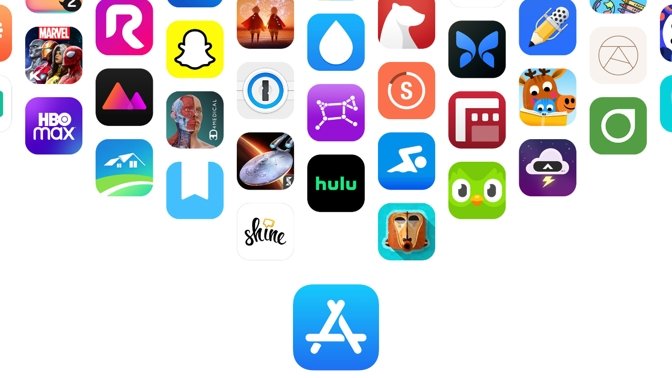Vocal app developer suing Apple over rampant scam apps on the App Store
After over a month of drawing attention to scam apps on the App Store, FlickType developer Kosta Eleftheriou has sued Apple over allegations of fraud, abuse of monopoly power, and the enablement of rampant scam apps.

Developer sues Apple over scam apps in the App Store
Earlier in 2021, Eleftheriou pointed out the number of scam apps on the App Store affecting his business. After allegedly running into roadblocks during development which let the competition get ahead, he is now suing Apple for damages.
His claims indicate that scam apps were able to steal his ideas and promote themselves using his screenshots and videos. Users would download a scam app and be met with a payment screen before the app would open up -- but ultimately the scam apps were broken.
Eleftheriou claims that potential customers were driven to scam apps using false advertising in the App Store, then those customers were scammed out of their money for fake apps. Eleftheriou also says Apple does nothing about this since the company profits from any transaction, real or not.
The claim also alleges that Apple approached Eleftheriou to acquire FlickType. After negotiations halted, however, he says that this app was suddenly being denied for "no reason."
Eleftheriou says this was done to keep him from competing while Apple profited from scam apps in the App Store. He states that Apple's monopoly position gives it the ability to control the market and dismiss developers they no longer favor.
These claims are echoed by Fortnite developer Epic Games. The rise in lawsuits over the App Store and how Apple handles its business is indicative of the attention brought on by Epic's loud protests.
The charges against Apple are as follows:

Developer sues Apple over scam apps in the App Store
Earlier in 2021, Eleftheriou pointed out the number of scam apps on the App Store affecting his business. After allegedly running into roadblocks during development which let the competition get ahead, he is now suing Apple for damages.
His claims indicate that scam apps were able to steal his ideas and promote themselves using his screenshots and videos. Users would download a scam app and be met with a payment screen before the app would open up -- but ultimately the scam apps were broken.
Eleftheriou claims that potential customers were driven to scam apps using false advertising in the App Store, then those customers were scammed out of their money for fake apps. Eleftheriou also says Apple does nothing about this since the company profits from any transaction, real or not.
The App Store has a big problem
You: an honest developer, working hard to improve your IAP conversions.
Your competitor: a $2M/year scam running rampant.
1/-- Kosta Eleftheriou (@keleftheriou)
The claim also alleges that Apple approached Eleftheriou to acquire FlickType. After negotiations halted, however, he says that this app was suddenly being denied for "no reason."
Eleftheriou says this was done to keep him from competing while Apple profited from scam apps in the App Store. He states that Apple's monopoly position gives it the ability to control the market and dismiss developers they no longer favor.
These claims are echoed by Fortnite developer Epic Games. The rise in lawsuits over the App Store and how Apple handles its business is indicative of the attention brought on by Epic's loud protests.
The charges against Apple are as follows:
- Falsely advertising that the App Store is a safe and trusted place.
- Unfair competition through blocking app development of its competitors.
- Breach of the covenant of good faith and fair dealing due to opaque guidelines and random enforcement.
- Fraudulently claiming that the App Store would be a place for developers to thrive while knowing it was not or ignoring the truth.
Kpaw LLC Versus Apple by Mike Wuerthele on Scribd
(function() { var scribd = document.createElement("script"); scribd.type = "text/javascript"; scribd.async = true; scribd.src = "https://www.scribd.com/javascripts/embed_code/inject.js"; var s = document.getElementsByTagName("script")[0]; s.parentNode.insertBefore(scribd, s); })();
Comments
The best thing to come about from this will be an independent third party telling him exactly the same.
allow multiple app stores. Wonder how well that would work.
https://www.scribd.com/document/499293895/Kpaw-LLC-Versus-Apple
I get his gripes, but in releasing an app that wasn't ready for primetime, his reviews suffered and the vultures circled. That's capitalism.
That said, the App Store is full of junk and in need of serious culling. Apple won the quantity war but it’s time for the quality war. Rating iOS Apps by adherence to iOS would be a good start.
I wrote a simple HLS player for Apple TV to use as a player at remote locations to view our broadcasts (church, school, whatever) where a non-techy person was going to be handling the on-site gear. I could give them the Apple TV preprogrammed with the URL, or email/text it to them to copy & paste into the app, then have them open the app when on site. If the app crashed or power failed, all they had to do was re-open the app to restart the stream. It is a great replacement for Windows laptops that would choose 15 minutes before the event to update themselves.
The Apple TV version of the app was accepted and has been on the store for a number of years. I decided to release an iOS version (the exact same app), but it was denied due to it being spam and lacking any kind of, well, anything. (Nevermind it's tvOS companion had been up for years.)
I find it amazing that all these copycat apps make it through review, and yet the "cousin" of one that's been up for years doesn't.